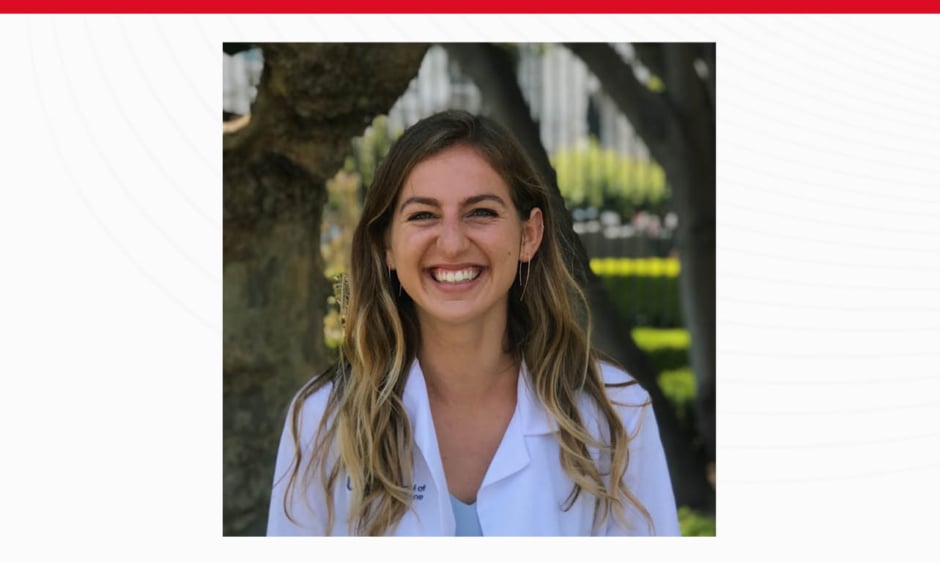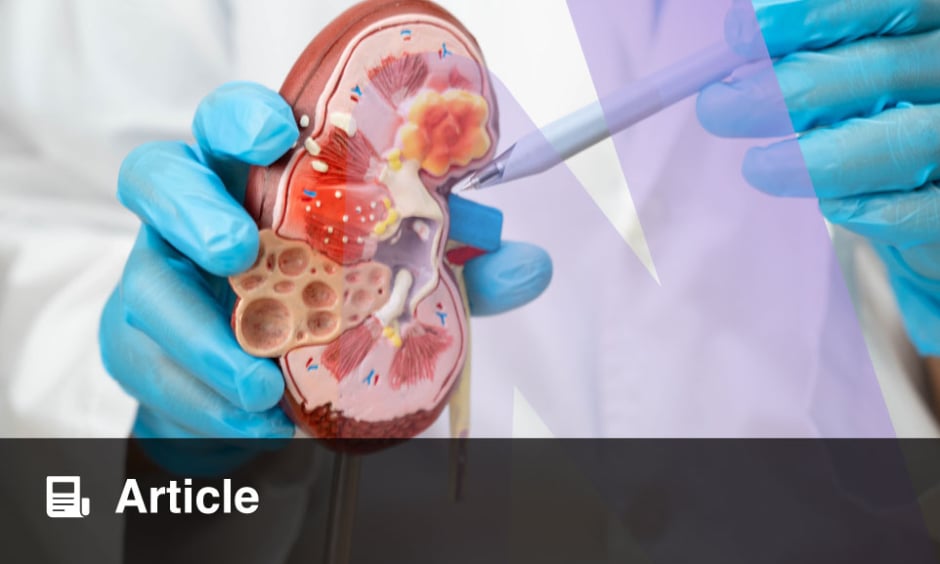Karly Hampshire | Medical Student, University of California, San Francisco, USA; Founder and Co-director, Planetary Health Report Card; Fellow at the University of California Center for Climate, Health and Equity, USA
![]()
What led you to want to study medicine?
Put simply, my desire to pursue a career in medicine was driven by the intimacy and power of serving people. This desire has been the result of many moments: reading heartfelt letters from patients with cancer, seeing Paul Farmer speak in high school, and witnessing childbirth. I believe medicine uniquely blends science, compassion, and care and, despite all of the flaws of the healthcare system, it’s very gratifying to bear witness to some of the most transformative moments of someone’s life and to help ease the suffering that can often accompany those moments.
While the climate work I engage in is rewarding in its own way, I think the pairing of more zoomed-in clinical work and more zoomed-out climate work will be critical for maintaining balance and mitigating burnout in my career. When I am feeling like the issues posed by climate change loom too enormously for me, as an individual, to make a difference, I can find solace in knowing that at least I can help the patient in front of me. And when I am exposed to all the structural issues my patients face and am feeling like efforts to address them individually are inadequate, I can take a step back and work to prevent worsening of inequities through larger scale climate action.
Was there a particular event or person that sparked your initial interest in campaigning to address climate change?
I have always been environmentally inclined. In fact, the reason I initially applied to Emory University, Atlanta, Georgia, USA, for an undergraduate degree was because they showed up on a ‘most sustainable universities’ list. However, my main focus in college was health and education for refugee and immigrant populations.
Through conversations with patients at the refugee and immigrant health centre that I volunteered at, I recognised climate change as an underlying force driving people from their homes, either directly through food insecurity or indirectly through the ensuing civic instability. I saw the toll it had wrought on mental and physical health, especially for the most structurally disadvantaged such as post-traumatic stress disorder, chronic conditions untreated for years, and sexual violence.
In my anthropology coursework, I explored how many of the recent displacement ‘crises’ had underpinnings in climate change (for example, the Syrian civil war). When I started medical school, I decided to make climate action my main focus as I saw climate change as the ‘great exacerbater’, threatening to worsen so many social issues, from displacement to food insecurity to homelessness to racism. I also felt like the healthcare workforce wasn’t talking enough about the role that we could play in mitigating downstream suffering through climate action.
As a medical student at the beginning of your career, where can we expect to see your focus lie in the coming years?
I am passionate about applied climate and health education and I’m interested in creating collaborative resources that will catalyse scalable, efficient, high-quality rollout of climate and health education across disciplines and levels of training. For example, I’m currently working with the Global Consortium on Climate and Health Education (GCCHE) on a multi-institutional collaboration called the Climate Resources for Health Education Initiative (CRHE), which seeks to create an open-access repository of adaptable peer-reviewed, problem-based learning sets and slides for undergraduate and graduate medical education. I imagine there will be a lot of potential for further spinoffs and growth there. In addition, as I enter residency and spend much more of my time in the hospital, and have more control over my clinical practice, I envision expanding my work more into the healthcare sustainability realm, working with organisations like Health Care Without Harm (HCWH).
You have published work that focuses on the ways in which the curriculum at medical schools needs to increase its consideration of sustainability. Why do you think it is important for future doctors to be aware and conscious of climate change and sustainability?
I think there are two sides to the importance of sustainability or climate change in medical education (also called Education for Sustainable Healthcare [ESH]). Firstly, climate change and other forms of ecological destruction are the gravest threat to health in the 21st century. The World Health Organization (WHO) already attributes almost a quarter of deaths and global disease burden to environmental degradation. Future doctors need to be prepared to diagnose, treat, and counsel on the health effects of this ecological degradation. Secondly, paradoxically, the healthcare system is itself a huge contributor to ecological destruction. If the global healthcare system was a country, it would be the fifth largest carbon dioxide emitter in the world. And there are simple things that doctors can do to reduce the environmental impact of their clinical practice (i.e., using sevoflurane instead of desflurane, or prescribing dry powder inhalers instead of metered dose inhalers). But without education, they have no idea the role they can play in bringing sustainability to their workplace and being part of the solution.
How does the University of California (UC) Centre for Climate, Health and Equity, San Francisco, USA, work towards the ambitious goal of making the health and equity impacts of climate change evident, urgent, and actionable?
The newly launched UC Center for Climate, Health and Equity seeks to leverage the power of the UC coalition to drive climate action that safeguards health. Their work spans four pillars: research, education, healthcare sustainability, and policy. In the research pillar, they aim to generate research at the intersections of climate health through cross-UC research collaborations. In the education pillar, they are creating education and training programmes across the UC health science schools, as well as supporting faculty and student curricular ambassadors. In the healthcare sustainability pillar, they are working to reduce the emissions of California’s healthcare sector and to increase system resilience by building patient education tools. And lastly, in the policy pillar, they are seeking to translate academic research and implement expertise into scalable impact, partnering with community organisations. Advancing health equity is a cross-cutting focus in all pillars. For example, we recently led an educational event on the health harms of proximity to oil and gas drilling sites, a topic with timely policy and equity implications in California.
What inspired you and your Co-founders to design and initiate the Planetary Health Report Card (PHRC)?
I started medical school at UC San Francisco (UCSF) in 2018. That September, the deadly and destructive Camp Fire raged through Paradise, California, USA. Even if you weren’t in California, you may have seen pictures on the news of the hazy, smoke-filled dystopian sky at that time. Contemporaneously with that awful wildfire, we were, ironically, in our pulmonary block at medical school. Yet, despite the fact that we were walking to school every day in N95 masks through an eerie dusk, breathing in some of the worst quality air in the world with many in the region, especially the most marginalised, experiencing the health consequences, there was no mention of the health effects of air pollution or wildfire smoke in our curriculum. Several classmates and I were struck by the profound lack of planetary health education. We felt that, as future health professionals, we must be prepared to address the impacts of human-caused environmental changes on our patients’ health. We learned that desire for curriculum on climate change was widespread among medical students. A research study I led found that among 600 medical students at 12 geographically diverse medical schools in the USA, 84% of students believed that the health effects of climate change should be included in the core curriculum, but only 13% believed that their medical school was currently providing adequate education on the topic. To help catalyse that institutional transformation, in 2019, several other UCSF medical students and I, with the help of many wonderful mentors, founded the PHRC.
Could you explain more about what the PHRC is and why it is important to both students and practicing healthcare workers?
The PHRC is a student-led, metric-based tool for evaluating and improving planetary health engagement in health professional schools. The PHRC spans five topic areas: curriculum; research; community outreach and advocacy; support for student-led initiatives; and sustainability. Student-led, faculty-mentored teams work collaboratively to create school-specific needs assessments based on metrics in each of these five areas and then leverage results to catalyse change.
Since its creation in 2019, the initiative has expanded rapidly to over 80 medical schools in seven nations, including the USA, UK, Ireland, Canada, Germany, Malaysia, and Japan. Its application is already bringing about transformative dialogue between students and leadership, serving as a platform to advance the curricular innovations that will fulfil the learning needs of students in a changing world. With our network of over 400 participating students across the world, we have created a robust community, facilitating dialogue among medical student climate health leaders, and hosting dynamic events such as our institutional advocacy workshop and first annual symposium. From the beginning, I dreamed of eventual expansion into other health professions and that vision is being realised with the rollout of international nursing and pharmacy pilots. Overall, for students hoping to take climate action within their spheres of influence, the PHRC helps pair the abstract complexities of tackling climate change with tangible action steps.
What was the mission you set out to achieve when you launched the Interview without Harm study, petition, and advocacy tool?
In spite of the significant health harms of climate change and climate change’s role in exacerbating underlying health inequities, healthcare systems, including medical education, contribute significantly to greenhouse gas emissions. COVID-19 has lent us the opportunity to reimagine the necessity of academic travel. In particular, in-person medical school, residency, and fellowship interviews are responsible for significant carbon dioxide emissions each year, as almost 100,000 medical trainees fly across the country multiple times, spending thousands of dollars each in the process. A permanent shift to virtual interviews would mitigate the majority of these emissions and could establish a model for reducing academic travel.
In addition, given the cost savings, virtual interviews would improve equity of the application process. Applicants interviewed virtually during the past two application cycles have been satisfied with their experience and many limitations can be overcome with structural solutions. Critical decisions about the future of medical training interviews in a post-COVID-19 era will likely be made this year, making this an opportune time to advocate to permanently change these unsustainable business-as-usual practices. However, I noticed that environmental considerations were frequently left out of cost/benefit discussions; for example, a >200 page document recently released by the Coalition for Physician Accountability, which outlined recommendations for the comprehensive improvement of the undergraduate medical education–graduate medical education transition, did not mention environmental impact once. The multi-pronged campaign I developed, Interview without Harm, seeks to address that gap.
Throughout your academic career as a medical student, what has been your proudest achievement?
My most cherished accomplishment has been spearheading the PHRC and watching it grow into such a widely used and powerful tool for change. There were so many times at the beginning of its development where I felt in over my head: having to design a leadership team structure, make strategy decisions, and formulate metrics amidst all my normal medical student responsibilities. Given all the initial imposter syndrome I faced, it feels really rewarding to reflect how far the project has come. Of course, it was very much a team effort, and there is no way the initiative could have achieved these milestones without the contributions of so many. But I think, when faced with the abstract complexity and enormity of climate change, it’s easy to feel futile. And I feel grateful that I found a way to push through my feelings of powerlessness and create something that is really making a tangible difference, both in ways that are easy to pin down (i.e., curriculum changes in medical education) and in ways that are more abstract (i.e., movement building).








